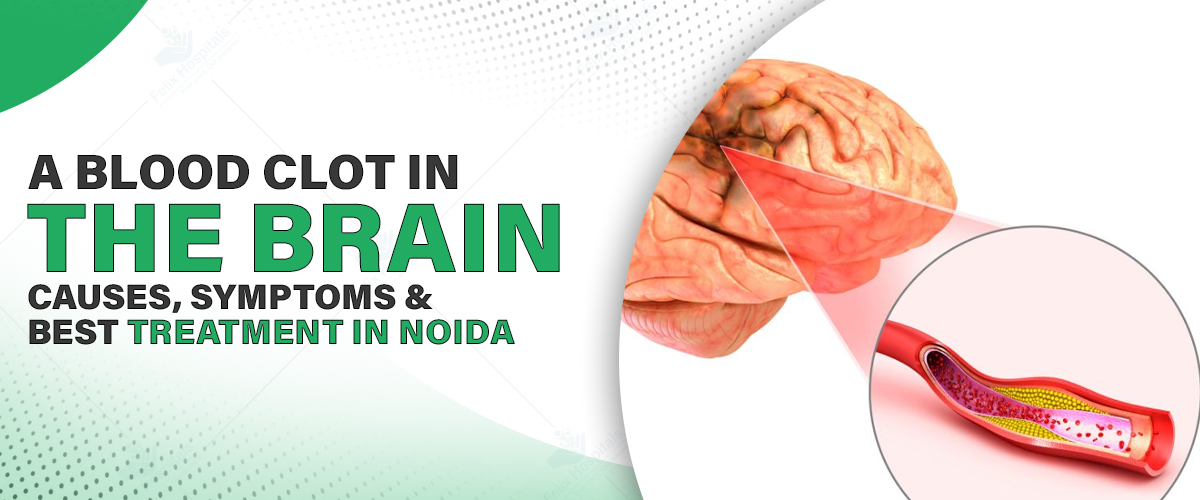
Subscribe to our

We all get headaches. Sometimes from stress, dehydration, or staring at a screen too long. But if a headache feels more intense and more sudden, especially followed by confusion, blurry vision, or difficulty speaking, it needs immediate medical attention. It might be a sign of something much more serious like a blood clot in brain.
Therefore, understanding what causes a blood clot, how to spot it, and most importantly, what doctors can do about it, can make all the difference. Timely treatment saves lives – and in many cases, prevents long-term damage.
So if you or a loved one experiences a sudden bout of headaches, confusion, or weakness in your face or limbs, don’t brush it off. These could be early signs of something serious like a brain clot. Seek medical help immediately!
At Felix Hospital, our neurosurgeons are trained to respond quickly with advanced diagnostics and treatment. To schedule an appointment, contact us at +(91) 9667064100!
A blood clot in the brain, also known as a cerebral thrombosis or stroke caused by thrombosis, happens when blood flow to part of the brain gets blocked by a clot. The brain, like every other organ, needs oxygen and nutrients. When a clot stops that flow, brain cells can start to die within minutes.
There are different types of strokes caused by clots. The most common is an ischemic stroke, which is due to a blockage. This is different from a hemorrhagic stroke, which involves bleeding in the brain.
Sometimes, the clot forms in a brain artery itself. Other times, it travels from another part of the body, like the heart or neck, and gets stuck in a narrow artery in the brain.
Clots don’t usually form out of nowhere. They often result from other underlying issues. Here are some of the most common causes of brain blood clot:
High blood pressure – Damages blood vessel walls, making clots more likely
Diabetes – Affects how your blood flows and how well your vessels work
Atherosclerosis – Hardening or narrowing of arteries due to plaque buildup
Atrial fibrillation – An irregular heartbeat that can cause clots in the heart to travel to the brain
Smoking – Increases clotting tendency
High cholesterol – Leads to blocked arteries over time
Obesity and sedentary lifestyle – Raise overall risk of stroke and clot formation
Head trauma – In some cases, injury to blood vessels can lead to clot formation
When a blood clot blocks an artery in your brain, symptoms usually come on suddenly. You might feel fine one moment, and very unwell the next. Common signs of blood clot in brain include:
• A sudden, severe headache
• Numbness or weakness, especially on one side of the body
• Difficulty speaking/slurred speech
• Trouble understanding what others are saying
• Blurred or double vision
• Dizziness or loss of balance
• Confusion or trouble concentrating
• Loss of consciousness or seizures
• F – Face drooping
• A – Arm weakness
• S – Speech difficulty
• T – Time to call emergency services
Doctors rely on a combination of symptoms and advanced imaging to figure out what’s going on. The process usually involves:
CT Scan or MRI: These help to identify if there’s a clot or bleeding.
CT Angiography or MR Angiography: These focus on the blood vessels and show exactly where the blockage might be.
Blood Tests: To check clotting factors, sugar levels, and cholesterol
ECG and Echocardiogram: If there’s a chance the clot came from the heart, these tests help detect heart conditions
If you suspect signs of a blood clot in brain, acting fast is the key! The treatment depends on how quickly the person gets to the hospital. The golden window is often the first 3 to 4.5 hours.
Thrombolytic (Clot-Busting) Drugs : The medication works by dissolving the clot and restoring blood flow. It must be given within a few hours of symptom onset to be effective.
Mechanical Thrombectomy: In some cases, especially with larger clots, doctors use a catheter to go into the brain’s arteries and physically remove the clot. This is done under imaging guidance and is highly effective when performed early.
Blood Thinners: If the stroke risk remains high, patients may be put on long-term anticoagulants to prevent future clots.
Lifestyle Changes and Rehabilitation: Post-stroke treatment isn’t just about medication. Physical therapy, occupational therapy, and speech therapy play a big role in recovery, especially if mobility or communication was affected.
A blood clot in the brain is serious and should be treated as a medical emergency. In many cases, it’s preventable. As mentioned, rapid treatment can dramatically change the outcome. At Felix Hospital, we provide comprehensive treatment for brain blood clots, including emergency care. We also provide rehabilitation and support care to all our patients recovering from the after effects of the brain blood clot or brain stroke.
Don’t ignore early signs and symptoms, especially if your body is giving you warning signs. Consult the best neurologists in Noida immediately to seek appropriate treatment.
Q1. Can you survive a brain clot?
Ans: Yes, many people survive and recover well, especially with early treatment. The key is recognizing the signs and getting help fast.
Q2. How long is the recovery after a brain clot?
Ans: It varies. Some recover in weeks, while others may need several months of rehab. Age, overall health, and how quickly treatment was received all play a role.
Q3. Are blood clots in the brain preventable?
Ans: Often, yes. Managing blood pressure, quitting smoking, staying active, and keeping diabetes under control can significantly lower your risk.
Q4. What’s the difference between a stroke and a brain clot?
Ans: A stroke caused by a clot is called an ischemic stroke. So technically, a brain clot is one type of stroke. There are other kinds too, like hemorrhagic strokes, which involve bleeding.